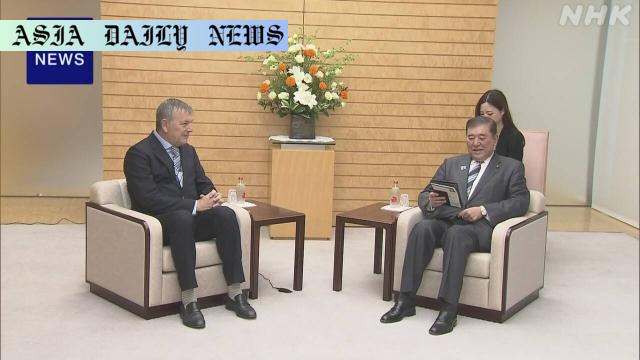Palestinian refugees face unimaginable hardships, while Japan pledges to support essential humanitarian aid with the cooperation of UNRWA.

Introduction: Japan’s Role in Addressing Gaza’s Humanitarian Crisis
Japan’s Prime Minister Ishiba Shigeru recently reaffirmed his country’s commitment to supporting Palestinian refugees during a meeting with Philippe Lazzarini, the Commissioner-General of UNRWA, the United Nations Relief and Works Agency. The discussion took place at the prime minister’s office in Tokyo, focusing on how best to address the worsening humanitarian crisis in the Gaza Strip. This collaboration highlights Japan’s continuing dedication to global humanitarian efforts, particularly in regions experiencing prolonged instability and extreme hardship.
Beyond Imagination: The Alarming Reality in Gaza
According to Lazzarini, the humanitarian situation in Gaza has reached catastrophic levels, with more than 500,000 individuals facing the imminent threat of starvation. The Gaza Strip, already beleaguered by decades of conflict and socio-economic challenges, now confronts a crisis that is “beyond imagination.” Families are grappling with food shortages, lack of medical supplies, and increasingly restricted access to essential services. What makes this situation more concerning is the near-cessation of external aid flows due to political and logistical barriers, further isolating the vulnerable population.
Japan’s Strategic Approach to Aid
During the meeting, Prime Minister Ishiba underscored the importance of creating an environment conducive to delivering effective humanitarian assistance. He highlighted the broader role of international partnerships, particularly Japan’s collaboration with UNRWA, as critical to easing the plight of Palestinian refugees. By leveraging its economic and diplomatic influence, Japan seeks to act as a stabilizing force in the region, ensuring aid not only reaches those in need but also contributes toward achieving long-term solutions.
UNRWA’s Response: Gratitude and an Urgent Call for Continued Support
Lazzarini commended Japan for its unwavering support over the years, calling it a lifeline for many Palestinian refugees. However, his remarks also carried a sense of urgency, as he elaborated on the dire conditions in the Gaza Strip. The Commissioner-General called for continued international solidarity, emphasizing the need for sustained efforts to mitigate the worsening crisis. He also stressed that organizations like UNRWA rely heavily on donor countries like Japan to continue their operations effectively.
The Broader Significance of Humanitarian Aid in Conflict Zones
The commitment demonstrated by Japan serves as an important reminder of the pivotal role that international collaboration plays in combatting humanitarian emergencies. The situation in Gaza is not isolated but rather indicative of global trends wherein protracted conflicts exacerbate vulnerabilities among civilian populations. By addressing these challenges, Japan and entities like UNRWA pave the way for a more equitable and compassionate international system.
Conclusion: A Joint Path Forward
As the humanitarian crisis in the Gaza Strip deepens, the need for international cooperation becomes more evident. Japan’s pledge to work closely with UNRWA not only addresses the immediate needs of more than 500,000 Palestinian refugees but also symbolizes a broader commitment to fostering global stability. This partnership offers hope for those enduring unimaginable hardships while setting a precedent for how countries can collaborate to address and mitigate crises on a global scale.
Commentary
Japan’s Pledge: A Beacon of Hope in Troubled Times
The Japanese government’s recent commitment to supporting Palestinian refugees through its partnership with UNRWA is both commendable and inspiring. It serves as a clear example of how nations can step up in times of need, bridging the gap between resources and those who desperately require them. In a world often plagued by indifference, Japan’s proactive approach to ensuring humanitarian aid reaches the Gaza Strip provides a sense of hope and solidarity.
The Human Cost in Gaza and the Critical Role of Aid
The crisis unfolding in Gaza is a stark reminder of the human cost of protracted conflict. Over half a million people are facing starvation—a figure that is as staggering as it is heartbreaking. Without sufficient international assistance, this dire situation will worsen. Nations like Japan demonstrating their willingness to engage in humanitarian aid showcase the power of collective action. However, aid efforts must not lose momentum; governments and organizations worldwide should rally behind UNRWA to ensure the delivery of critical resources.
The Challenge of Sustained Global Attention
While today’s headlines often focus on fleeting issues, it is essential to sustain focus on crises like the one unfolding in Gaza. Japan’s commitment goes beyond mere words; it exemplifies the kind of consistent, meaningful action that all nations should aspire to. By staying engaged, offering resources, and fostering international dialogue, Japan sets a precedent for how global governments can play active roles in resolving humanitarian crises. This initiative should serve as a model for other nations to follow.


